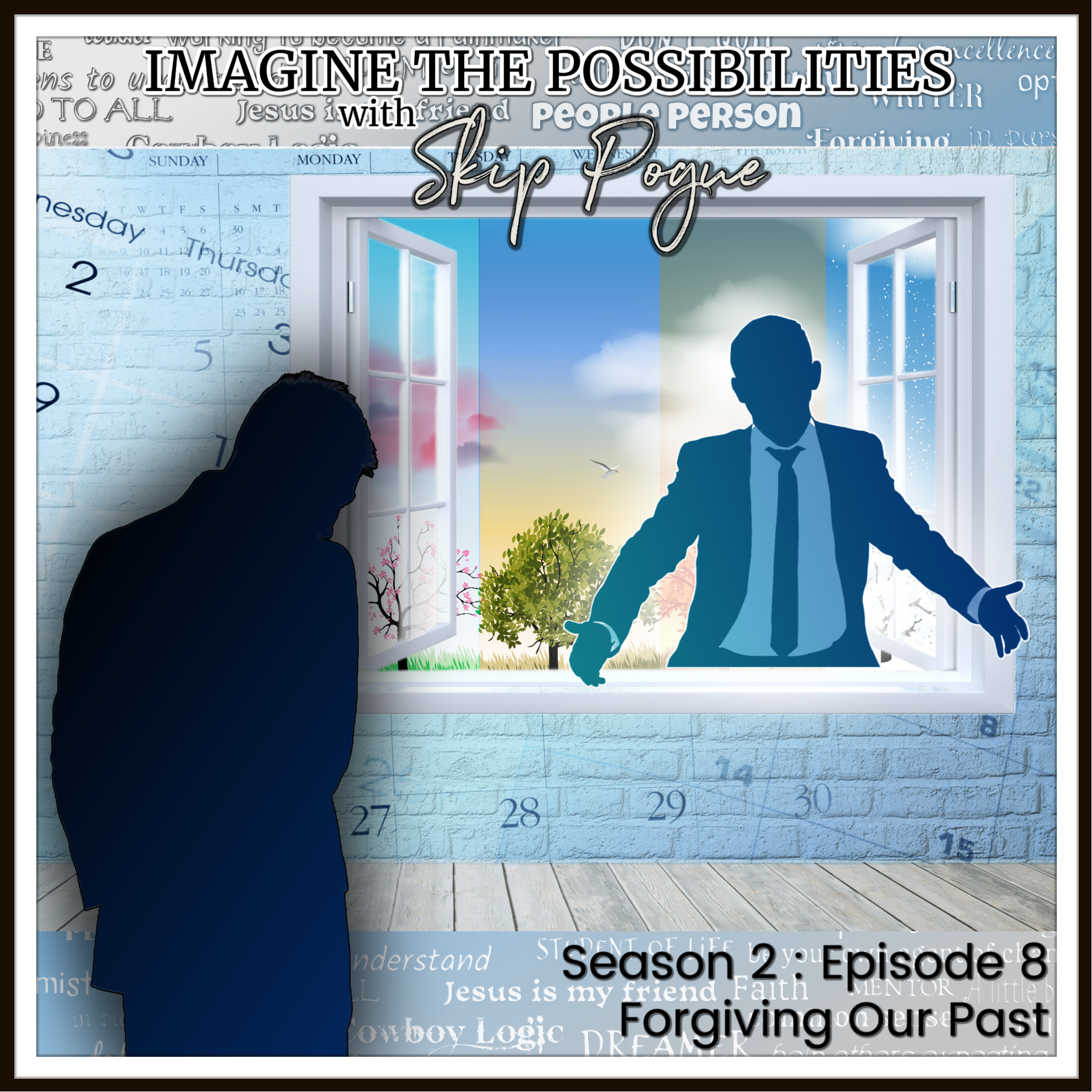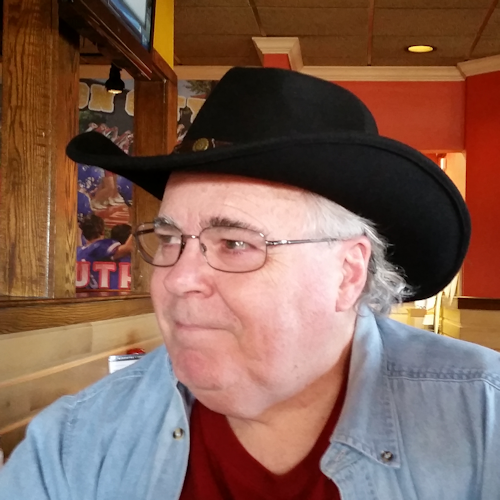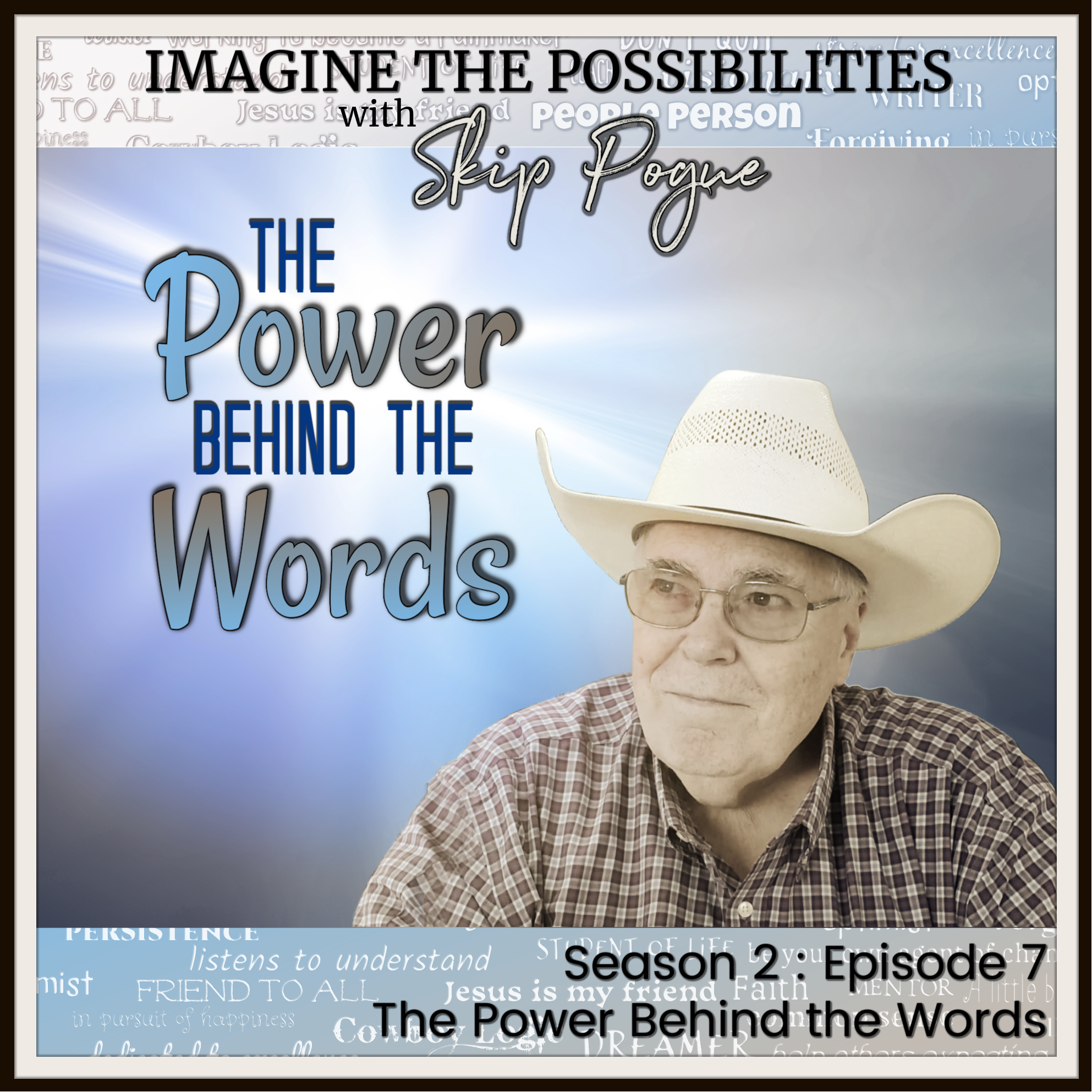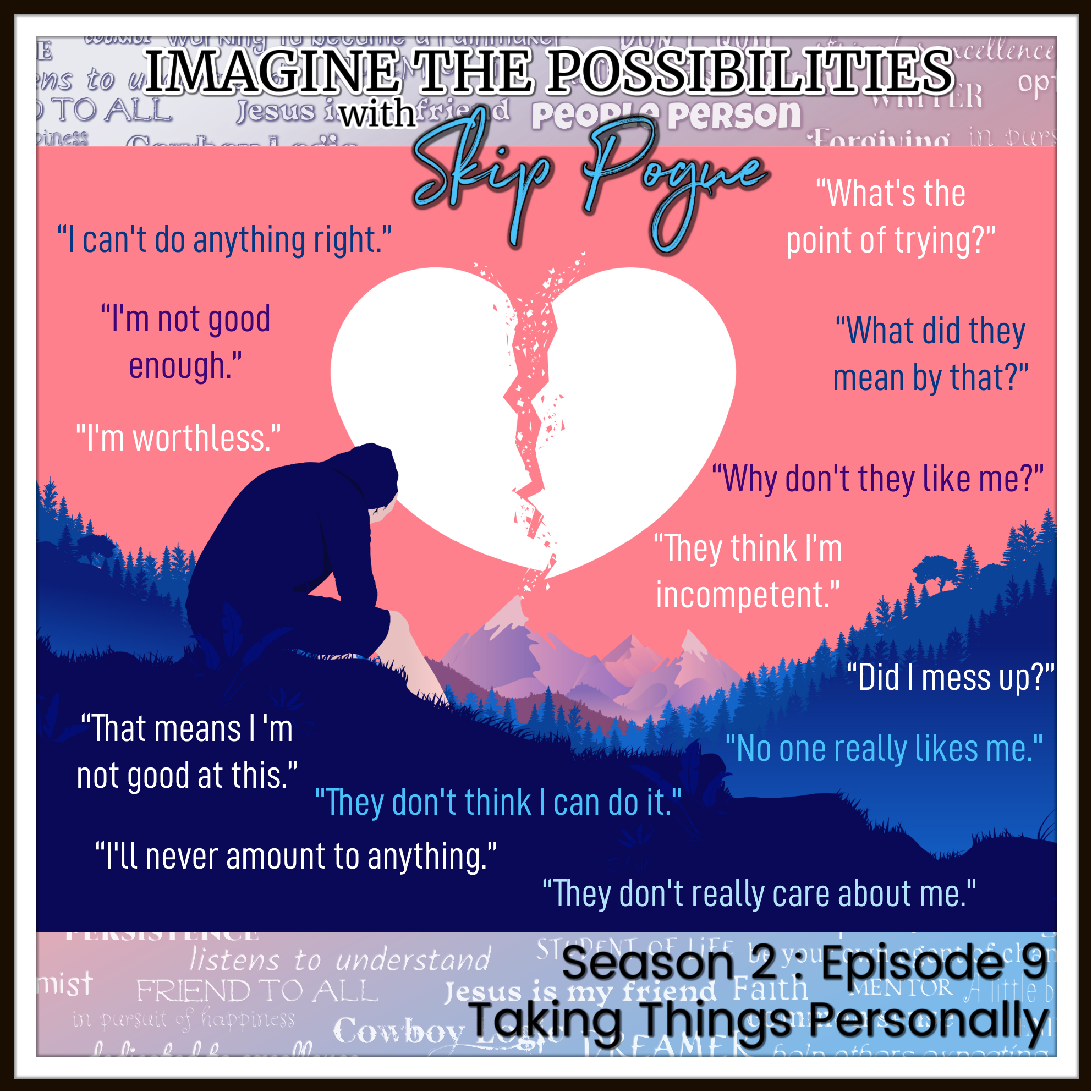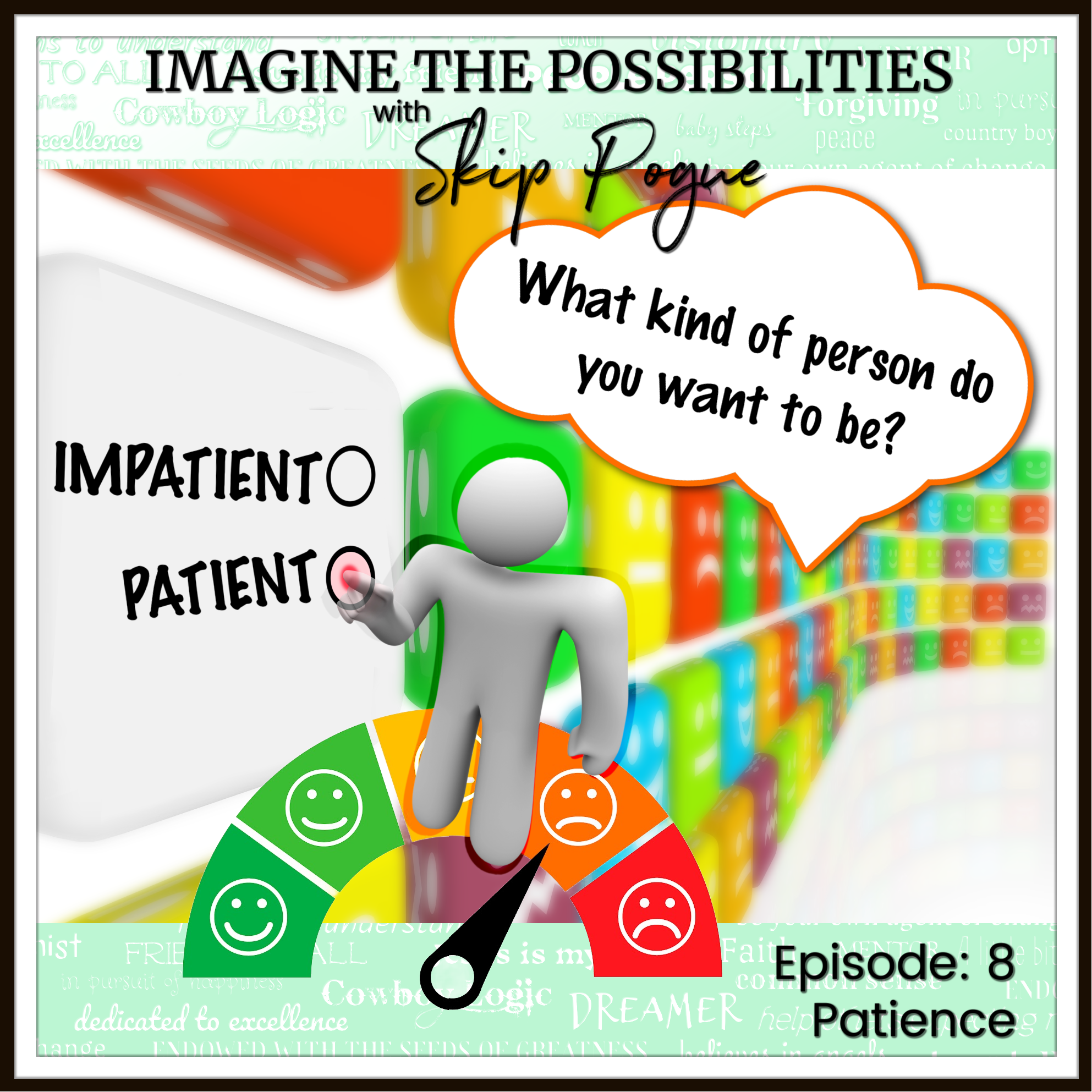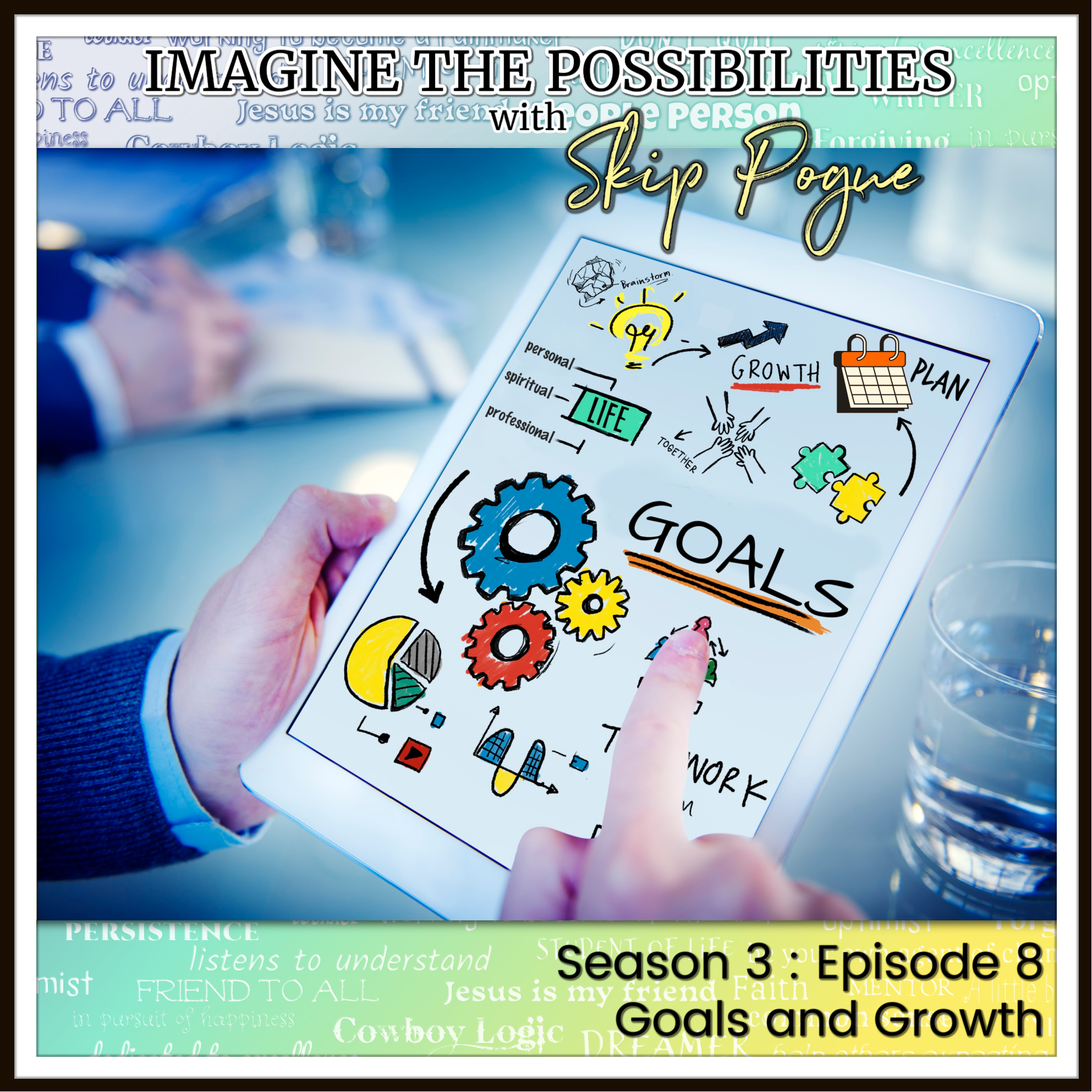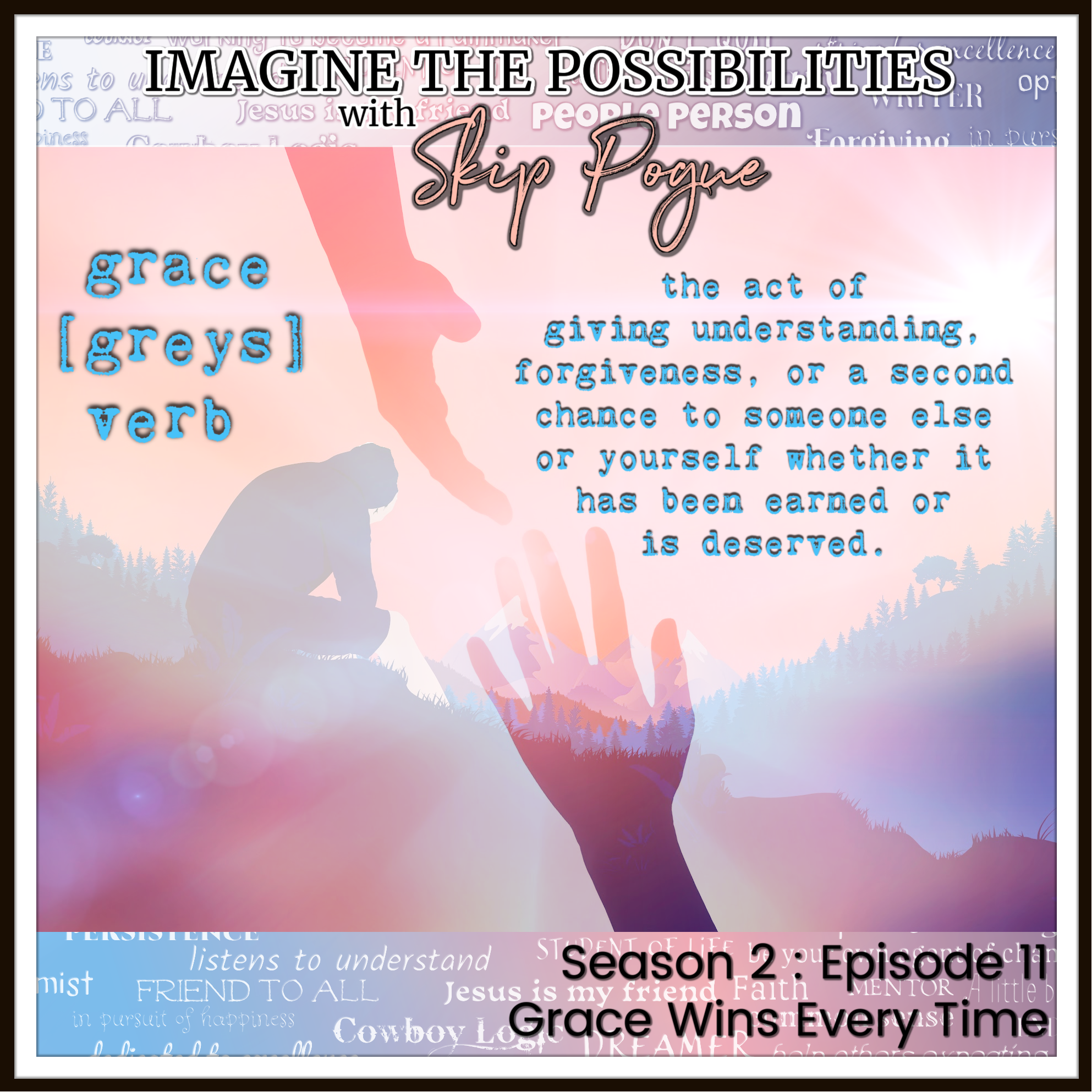Today, we’re diving into one of the hardest kinds of forgiveness—the kind we give ourselves. We all carry parts of our past that still tug at our hearts. Maybe it’s a decision we regret, time we can’t get back, or words we wish we’d said—or not said.
The truth is, we’ve all lived through moments that shaped us. Some made us stronger. Others left scars. But those moments don’t have to define us.
View Full Transcript
Episode Transcript
[00:00:11] Hello, and welcome to Imagine the Possibilities. My name is Skip Pogue. This is season two, Episode eight, and it's titled Forgiving Our Past. If you're new to this podcast, this space is where I explore real stories, honest reflections, and practical tools to help each of us grow personally, professionally, and spiritually. I talk about things that matter, things that challenge us, things that push us to think differently and move forward with purpose. And today's topic is forgiveness. And that's a big thing that we need to do is forgive. But this one is especially hard because the person we need to forgive is ourselves.
[00:00:58] We're not talking about pretending the past didn't happen, because each of us knows it did. We lived through it. We fought the hard fights, we conquered the mountains sometimes, and sometimes we even failed. And those times, hopefully, each of us got up and tried again until we did succeed. But what I'm really wanting to talk about is that we've got to stop letting our past define who we are. More importantly, we've got to stop letting our past steal who we can become tomorrow. Before we dive in, I want to mention a book I recently picked up that feels like it's a natural fit for this conversation.
[00:01:43] It's called the Book of Forgiving by Desmond Tutu and his daughter Mpo. I think that's the way her name is pronounced. I've just started reading it, so I can't speak for the entire book, but from what I've read so far, which is only a couple chapters, it seems to be really heartfelt and a powerful guide to this whole process of forgiveness. It's thoughtful, it's compassionate, and it's grounded in real world experiences. So if today's message speaks to something inside of you and you're looking for a little bit additional support, this book might be worth picking up.
[00:02:23] All right, grab a cup of coffee, take a breath, settle in, and let's talk about what it really means to forgive our past.
[00:02:32] I want to start out talking about the difference between remembering and reliving our past. Probably one of the most important lessons I learned, I'll be honest, it was a struggle.
[00:02:45] It was hard for me. But here's the lesson. There's a big difference between remembering our past and reliving it. If we remember our past, it's healthy. We've all done it. We've all thought about things that bring a smile to our face or maybe things that made us cry. But overall, it's healthy to just remember our past. It's a good thing. In fact, it's really necessary that we remember our past. That's how we take ownership of it. It helps us make better choices. It helps us grow. The fact is, it's necessary to remember our past. But reliving it, that's something else that can bring all kinds of things up that we don't need to carry with us. Things like regret over something we did, or pain, maybe somebody hurt us or something, and the pain still with us. And we just relive it over and over and over.
[00:03:48] All of us have done it. I have.
[00:03:51] Even though I know better. There's probably times. I know there's times I still do that, but as soon as it starts, I use some of the things I'm going to talk about today to kind of put it aside.
[00:04:04] Here's one of the things. Sometimes when we relive our past, it impacts us dramatically. Our confidence may be swayed a bit. We may not be as confident as we normally are when we approach certain things.
[00:04:21] It can affect our relationships with people, even our spouse.
[00:04:26] It can change our ability to trust and even our ability to dream.
[00:04:35] I'll share something personal with you. This is kind of an example.
[00:04:41] Years ago, I had a job that kept me on the road a lot.
[00:04:45] One year I was gone 40 weeks out of 52 weeks.
[00:04:52] I'd fly home every other weekend, land on a Friday, and I was back out on either a Sunday evening or Monday morning early.
[00:05:00] It was so bad that I eventually got two hanger bags to carry my clothes in and basically purchased two sets of clothes. And I would keep one hung up in the closet that had the clean clothes in it. And when I got home, I would take the one I had with me, take all the clothes out of it, take them to the cleaners and tell them that it's going to be two weeks before I pick this up. So there's no rush. Hang the empty bag in. Sunday night came, grabbed the full one, and off I went again. I didn't get to spend time like I wanted to with my wife.
[00:05:38] And it impacted her because she was left to handle the kids, handle the household stuff, handle the finances and everything else. And I knew it was hard for her.
[00:05:50] I thought I was doing the right thing.
[00:05:53] I was working on my career and I was providing for my family.
[00:05:59] But the problem was that in doing that, I missed so much. I already said I missed my wife, but I missed my son and daughter.
[00:06:09] One was in college and the other one was in high school. But it was a local college and a local high school, so they were home Every evening. And I didn't get to see them even when I got home. They may have had a date, went out with their buds or something.
[00:06:24] I didn't get to see them much, even on the weekends. I thought about the number of times that my wife, my daughter and my son sat down at the table and I was represented by an empty chair.
[00:06:39] I also missed all those small things that happened through a day.
[00:06:43] A look, I love you, a hug from the kids, whatever.
[00:06:50] And it bothered me. But like I said, I felt like I was doing the right thing. Even when my travel slowed down and I was home more. I felt like I had to make up for the lost time. That makes sense.
[00:07:06] And there were times that I overcompensated for it. I'd apologize for things that no one else had brought up.
[00:07:15] I kept replaying missed opportunity, wondering what kind of memories we could have made together.
[00:07:23] That wasn't reflection, that was reliving.
[00:07:29] The thing is that reliving doesn't bring healing.
[00:07:33] It just makes those memories, or lack of open wounds.
[00:07:41] So I want to ask you, what part of your past are you still reliving?
[00:07:47] What memory still sneaks into your thoughts when things go quiet?
[00:07:53] Because here's the deal.
[00:07:56] We can't start the next chapter of our life if we're stuck re reading the last one.
[00:08:03] You have to remember. You have to think about the fact that we're not the same version ourselves.
[00:08:11] We've grown.
[00:08:13] We may have stumbled, but we got back up.
[00:08:16] We've learned things that the younger us didn't know at all.
[00:08:23] Let's give ourselves credit. Let's give ourselves grace. Let's let our past be our teacher, not our judge.
[00:08:34] Let it help shape us and allow us to thrive, not just survive.
[00:08:41] And most importantly, we don't have to keep reliving what we've already lived through.
[00:08:49] I want to talk a little bit about some things we can do to move toward forgiving ourselves, forgiving our past. So how do we actually do that?
[00:09:02] How do we stop dragging our past around like an anchor and begin to truly forgive ourselves?
[00:09:09] I wish I could say it's simple, that it was as simple as flipping a switch. But we all know that's not true.
[00:09:18] Forgiveness, especially self forgiveness, isn't a moment. It's a journey.
[00:09:26] And like most journeys, it begins with a single step.
[00:09:32] Here's some of the things that help me, and hopefully they'll help you.
[00:09:39] First thing we've got to do, and this is true for any problem we're having, is acknowledge it. We can't heal what we won't acknowledge, Whether it's something we did, something we allowed to happen, or something that happened to us, We've got to acknowledge it honestly and we've got to face it.
[00:10:01] Write it down, say it out loud.
[00:10:07] Bring it into the light.
[00:10:09] Here's the thing. We allow the pain to stay hidden. It tends to grow in the dark.
[00:10:16] Awareness is the first crack in the wall we've built around our old pain. Awareness allows us to shine a light on the thing we need to focus on. Keep that in mind.
[00:10:28] We also need to find the lesson in what we've done. The thing is, pain is a terrible teacher, but it is a powerful teacher.
[00:10:37] We've got to ask ourselves, what did we learn? What did we figure out about what went on? Maybe what we're looking at helped us set more boundaries, for better boundaries. Maybe it talked to us and taught us to slow down or to choose different people. And hopefully it taught us to value the present more deeply. Because we can't live in the past. We've got to live in the moment. Otherwise, it just gnaws at us and wears us down. Eventually, finding the lesson doesn't justify the pain, but it does give it purpose.
[00:11:17] Next thing we can do is extend the compassion, especially to ourselves. If one of our friends came up and talked to us about what they were going through in reliving the past, we would probably be really compassionate. We would be really empathetic.
[00:11:34] But here's the thing we have to remember, and I hope you understand this, we're not the same people that made those mistakes.
[00:11:43] We've grown, We've learned, we've changed.
[00:11:49] And if we wouldn't judge one of our friends as harshly as we judge ourselves, it's time to start offering ourselves the same compassion that we would offer them, someone else hurt us. Forgiveness isn't about letting them go, about excusing what they did to us. It's about releasing ourselves. It's saying we won't let what happened to us keep defining us.
[00:12:19] Think about it. If we internalize that, that someone hurt us and we internalize it and don't forgive them, we're going to live with that all of our life. Although forgiveness of another person is hard, we're not doing it for them.
[00:12:34] They might not even know we forgave them. We're doing it for us. The point of all that is that doing that will let us off the leash. Because I've been down that road where somebody hurt me deeply and they might not even have known it. Or they might not even care they did it, but I was reliving it over and over, and I let control sometimes my emotions, sometimes the decision I'd made. You know, you're going to put yourself out there. You're going to do something that is different than what you've done. And as you're thinking about it, that pain comes up.
[00:13:14] So we've just got to let it go. We've got to learn to let it go and live in the moment.
[00:13:19] Thing is, we can let that be part of our story, but not our whole story.
[00:13:26] We're not the worst moment we ever experienced. We're not our biggest regrets.
[00:13:32] We are a whole story. And we're in the process of writing everything to the end, and we're not there yet.
[00:13:42] We don't have to forget about it. We don't really even have to stop feeling it, but we've got to loosen our grip on it. We can say this shaped us, but it doesn't own us. This lives in my memory, but it no longer lives in the decisions I make or the direction I go.
[00:14:02] Things like that. When we realize those things and maybe say them out loud, that's something that's powerful. That's where freedom comes from.
[00:14:14] Before I close today, I want to offer you two things. A moment of reflection and a simple challenge.
[00:14:22] Take a deep breath and ask yourselves, what part of my past still speaks the loudest?
[00:14:30] Then ask yourself, what would change if I stopped reliving it and started releasing it?
[00:14:38] The thing is, we're not trying to erase our past. We're trying to stop carrying what was never meant to be permanent.
[00:14:47] Now for the challenge.
[00:14:50] Pick just one moment from your past, one thing that still tugs at your heart or lingers in your thoughts. Then do one small thing to begin letting it go.
[00:15:02] Write it down and tear it up. Or talk to a trusted friend about it. Or if you've got a mentor, talk to them.
[00:15:10] Or what I sometimes do is pray over it or meditate about it, or just say, that chapter is over. It's part of me, but it's not all of me. It doesn't define me. That one small act of releasing part of your past can be the beginning of a lifetime of freedom. A lifetime without that pain, that aggravation.
[00:15:37] And I ask that you remember this. We survived by grace. Now it's time to live in that same grace. Not in the shadows of yesterday.
[00:15:47] We've made it this far. We've overcome more than we give ourselves credit for. And as for our future, it's still there and it's wide open. We just got to grab it and move forward.
[00:16:01] Before I wrap this up, I just want to say thank you truly, for taking time out of your day to listen to my podcast. I know there's a lot of voices out there, there's a lot of noise, and I know you've got a lot on your plate. So the fact that you've chose to spend this time, your time listening to this podcast means more to me than you'll ever know.
[00:16:25] I said it before. The reason I started this whole podcasting thing is simple. I didn't think I could be successful unless I helped everyone else, everyone around me, you and everyone else become successful too.
[00:16:43] And I still believe that to be true. But something, I guess, that I'm starting to realize. And it feels deeper than just helping somebody, someone. And I believe this with everything in me that we're all capable of, of accomplishing remarkable things.
[00:17:04] I believe we've got the strength, the potential and the purpose to rise above anything that tries to hold us down. I truly do.
[00:17:14] And my goal for this whole thing, it's not just to give advice or share stories. I could just do that and it would be easier for me for sure, because I'm not sure everybody's aware. But when I do something like this on Forgiving Ourselves, I do a lot of research. I write a lot of stuff down and reread it and actually make little post it notes of sections that I want to talk about. And I probably told that before, but that's just the way I roll on this. I do that to help myself and everyone that listens to this find more joy, more clarity, and more peace in the middle of life as we live it today. I guess the only way to say it is that we walk with each other through the challenges we face. And my desire for that walk is that we both come out better on the other side.
[00:18:14] Whether today's episode gave you something to think about, something to feel, or something to finally release your past, I'm grateful that we got to share this time together. And as always, I'll leave you with this.
[00:18:30] I wish you much success.
[00:18:32] Remember that your future belongs to you.
[00:18:36] Stay humble, be kind, love unconditionally, and laugh often.
[00:18:42] I hope that you have a super day and I pray that God blesses you in a super way.
[00:18:48] Thanks again and God bless.
